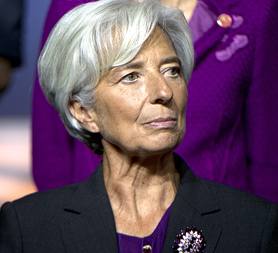Eurozone must build up own bailout funds says Osborne
George Osborne tells Channel 4 News that building the resources of the IMF should not substitute the eurozone building their own bailout funds, as Europe comes under pressure at the G20 in Paris.

Speaking to Channel 4 News economics editor Faisal Islam in Paris, Chancellor George Osborne said the pressure is on the eurozone to sort its problems out.
“They need to increase the resources of their bailout fund from eurozone members. They need to deal with their banks. And they need to decide what to do with Greece and stick to the decision,” he said.
Efforts by some countries to increase the International Monetary Fund’s (IMF) ammunition to fight the crisis ran into resistance from the United States and others on Friday.
Mr Osborne also put the onus firmly back on Europe, adding: “I think there’s a separate decision about the IMF…Building up the resources of the IMF should not be a substitute for the eurozone building up their bailout funds…I regard them as seperate issues.”
The US is among countries keen to keep pressure on the Europeans to act more decisively to end the crisis that began in Greece but has since spread to Ireland and Portugal and is lapping at Spain and Italy.
Europe set for biggest bailout in world history
A day of riot and recapitalisation in this eurozone crisis, writes economics editor Faisal Islam. That's the view from teh G20 finance meeting in Paris.
Protest against the banks, in a week I believe will end with the biggest bailout in world history, of the single currency, and also of the Eurozone's banks.
Read more: Europe set for biggest bailout in world history
Germany and France are trying to put flesh on the bones of a crisis resolution plan in time for the EU summit. It will involve plans to recapitalise banks, make Greek’s debt mountain more sustainable and ramp up the firepower of the bloc’s rescue fund. For once in the long-running crisis, the timetable is ambitious.
There were growing signs that Greece’s creditor banks would fight any attempt to make them shoulder a bigger burden in restructuring Greece’s debts.
The Franco-German plan is likely to ask banks to accept bigger losses on their debt than the 21 percent agreed in July, which looks insufficient.
They need to increase the resources of their bailout fund from eurozone members. They need to deal with their banks. And they need to decide what to do with Greece and stick to the decision. Chancellor George Osborne
Yet to be decided is whether that can be achieved with the voluntary participation of the banks. Much depends on their attitude.
A draft communiqué, that has to be signed off by all G20 finance chiefs, has set out the need for “further work to maximise the impact” of the EFSF bailout fund, in unusually direct language.
The make or break moment for the eurozone crisis is expected to come at a summit of EU leaders towards the end of the month. Germany and France have promised to set out a plan to stop infection, protect Europe’s banks and the wider world economy.
The lead negotiator for private sector bondholders said imposing greater losses on Greek bondholders could prompt investors to sell other countries’ sovereign debt and destabilise the single currency.
“We do not see that a compelling case has been made to reopen the (July) deal. A deal is a deal,” Charles Dallara, managing director of the Institute of International Finance (IIF) told the Financial Times.
European Central Bank member Juergen Stark, who has resigned in protest at the handling of the euro zone crisis, warned Europe risked damaging its standing among investors.
“Governments should honour their obligations,” he told Dutch newspaper NRC Handelsblad. “This makes Europe look like a very risky region to invest in.”
The draft communique said the G20 would “ensure that banks are adequately capitalized and have sufficient access to funding. Central banks have recently taken decisive actions to this end and will continue to stand ready to provide liquidity to banks as required”
Fears about the damage a default by Greece – and possibly others – could inflict on the financial system have driven a confidence-sapping bout of market volatility since late July, with global stocks falling 17 percent from their 2011 high in May.
However, the markets have picked up since the leaders of France and Germany set themselves an end-October deadline for action
-
Latest news
-
Laughing Boy: New play tells the tragic tale of Connor Sparrowhawk5m

-
Sewage warning system allows some of worst test results to be left off rating system, analysis shows3m

-
Post Office inquiry: Former CEO didn’t like word “bugs” to refer to faulty IT system4m

-
Israeli soldier speaks out on war in Gaza12m

-
PM’s defence spending boost should be ‘celebrated’, says former Armed Forces Minister4m

-




